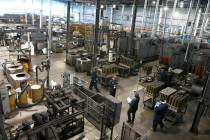Ten occupations poised to expand
With the help of research firm Discovery Nevada, as well as an assist from the state Department of Employment, Training and Rehabilitation and the U.S. Bureau of Labor Statistics, we've pinpointed 10 fields with high concentrations of jobs in the state or city, as well as strong growth prospects over the next five to 10 years. Some growth and salary figures are available only at state or national levels.
Massage therapist
U.S. growth, 2006-2011: 52.2 percent
Local growth, 2008-2018: 10.2 percent
Education: High school diploma, massage training certification
Local mean wage: $26,820
If there's any doubt Nevada is Massage Central, consider these stats from the U.S. Bureau of Labor Statistics: Nevada ranks No. 2 in the nation for its number of massage therapist jobs, and Las Vegas ranks No. 8 for its concentration of jobs in the field. Massage therapists just starting out typically work part time for spas, hospitals or physical therapy centers until they can build a client base and strike out on their own.
Dental assistant
U.S. growth, 2006-2011: 7.1 percent
Local growth, 2008-2018: 34.3 percent
Education: One year of community college
State mean wage: $35,080
From administrative work to basic care, dental assistants have wide-ranging responsibilities. When they're not handling billing or scheduling appointments, they're processing X-rays, removing sutures or giving topical fluoride or anesthetics. Essentials include organizational skills, communication abilities and a gentle touch, particularly with nervous patients, the statistics bureau says.
Medical assistant
U.S. growth, 2006-2011: 31.7 percent
Local growth, 2008-2018: 33.8 percent
Education: One year of community college
State mean wage: $30,910
Doctors in every specialty need medical assistants to collect lab samples, give injections, collect patient details and help with prescription orders. An aging national population and a demographic shift to the Sun Belt mean persistent growth and an ongoing need for medical workers. This job is best for people with good communication and critical-thinking skills who enjoy helping others.
Radio, cell and tower installer and repairer
U.S. growth, 2006-2011: 106.7 percent
U.S. growth, 2010-2020: 29 percent
Education: Two- or four-year degree in electronics or communications
State mean wage: $52,370
Consumers want phones to handle more data faster, which means more work for the people who install, upgrade and fix radio and cell towers. Giving Las Vegas an edge in this category is its substantial high-tech infrastructure, including fiberoptics networks and colocation servers. Those advantages bleed over into demand for other technologies, such as wireless, and call for more workers. Nevada's mean wage is the nation's fifth highest.
Education, training and library jobs
U.S. growth, 2006-2011: 23.2 percent
U.S. growth, 2010-2020: 15.1 percent
Education: Two- or four-year college degree
State mean wage: $51,700
This field excludes teachers but includes teachers' aides and instructional coordinators, who look at whether a school district's curriculum and teaching techniques are working. Expect gains in the field as schools hire teaching assistants on pace with enrollment increases and demand for special-education services, and recruit professionals to improve teachers' effectiveness. In this field, Nevada pays far better than the national mean of $41,000.
Fitness trainer, aerobics instructor
U.S. growth, 2006-2011: 12.4 percent
Local growth, 2008-2018: 5.2 percent
Education: Trade group certification.
State mean wage: $29,800
Nevada has an above-average numbers of acrobats, aerialists and other workers, many of whom offer fitness training on the side, said Jake Joyce, director of primary research and analysis at Discovery Nevada. Demand will also grow as our aging population tries to stay healthy and businesses and insurers encourage or even mandate wellness programs to combat obesity and promote healthy living for younger people.
Nonfarm animal caretakers
U.S. growth, 2006-2011: 33.4 percent
U.S. growth, 2010-2020: 20 percent
Education: High school diploma, some certification
Mean wage: $21,830
Where there are tigers and sharks, there are people who take care of tigers and sharks. Animal attractions on the Strip, from Siegfried & Roy's Secret Garden and Dolphin Habitat at The Mirage to Mandalay Bay's Shark Reef, have much to do with Nevada's above-average concentration of animal caregivers. The category also covers less exotic critters, such as dog groomers, kennel attendants and shelter workers.
Orthotists and prosthetists
U.S. growth, 2006-2011: 29.7 percent
U.S. growth, 2010-2020: 10 percent
Education: Master's degree in orthotics and prosthetics
Local mean wage: $86,730
Quick: What are the two top causes of limb loss? Diabetes and heart disease, both more common in a grayer population. Enter above-average demand for prosthetic limbs. Older people are also likelier to need orthotic devices such as supportive leg braces and orthopedic footwear. The field is well-established in Las Vegas, with a pay scale to prove it: Among cities, Las Vegas has the seventh-highest mean wage.
Aerospace engineering and operations technicians
U.S. growth, 2006-2011: 12.2 percent
U.S. growth, 2010-2020: Up to 2 percent
Education: Associate's degree
Local mean wage: $67,440
Credit Nevada's longtime presence in space and defense research for a high concentration in this field. Subcritical nuclear testing and research still happen at the Nevada Test Site, and space-related endeavors include Bigelow Aerospace, a North Las Vegas company that's joined the private space race. On top of above-average numbers of technicians, wages also go sky-high: Las Vegas' mean salary ranks No. 5 nationally.
Postsecondary teachers
U.S. growth, 2006-2011: 14.4 percent for vocational teachers
Local growth, 2008-2018: 21.7 percent
Education: Bachelor's degree
State mean wage: $50,070 for vocational teachers
Postsecondary education will grow as people look to supplement their high school diplomas with added training. In Nevada, vocational teaching grew especially fast in the recession, as workers looked for certification to advance on the job or begin a new career. The Bureau of Labor Statistics says job growth will be especially brisk in for-profit schools.
OTHER WINNERS
Researchers with Discovery Nevada identified about 45 other job categories with high concentrations and above-average growth prospects. They include:
(Job category, followed by growth rate, 2008-2018)
Cardiovascular technologists and technicians, 11.9 percent
Skin care specialists, 15.5 percent
Sound engineering technicians, 11.1 percent
Bakers, 20.3 percent
Sales managers, 16.9 percent
Meeting and convention planners, 9.2 percent
Retail supervisors, 10.3 percent
Taxi drivers and chauffeurs, 8.8 percent
Tour guides and escorts, 19.5 percent
Commercial pilots, 8.3 percent
Media and communications workers, 8.6 percent
Restaurant cooks, 5.9 percent
Source: Nevada Department of Employment, Training and Rehabilitation; Discovery Nevada
LOSERS
Several job categories don't have the most promising local future. In these fields, Southern Nevada has a high concentration, but there'll be less demand for those services in years to come.
(Job category, followed by growth rate, 2008-2018)
Gaming managers, -6.5 percent
Security guards, -4.6 percent
Gaming and sports book writers and runners, -8.4 percent
Plasterers and stucco masons, -4.8 percent
Travel agents, -9.0 percent
Insulation workers, mechanical, -9.5 percent
Actors, -1.9 percent
Theatrical and performance makeup artists, -6.8 percent
Protective services, -1.4 percent
Civil engineering technicians, -1.9 percent
Electricians, -4.8
Source: Nevada Department of Employment, Training and Rehabilitation; Discovery Nevada























